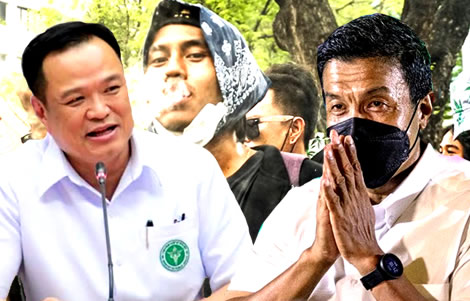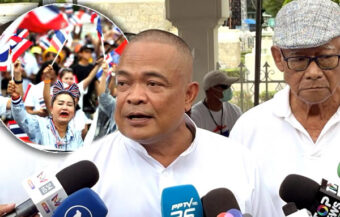Cannabis revolution places Thailand in danger: Police and drug control agencies agree that under the current legal provisions in force, unrestricted recreational use of cannabis is legal and the order of the day. It is only subject to official advice and health regulations governing smoke from the drug in restricted spaces. The current situation is being described as potentially dangerous with police trying to find a framework to prohibit the abuse of marijuana by members of the public in control of mechanically propelled vehicles on Thai roads. Despite this being illegal in theory under the Road Traffic Act Section 43(1), it is currently difficult to enforce.
Concerns are growing that last week’s cannabis or marijuana revolution in Thailand may have unleashed chaos and confusion as senior police scramble to regulate road safety while a corresponding law to control the abuse of cannabis and unbridled recreational use of the drug is stalled in parliament. These concerns were expressed in the last 24 hours by Bangkok’s newly elected governor Chadchart Sittipunt as well as earlier by a senior official with the Ministry of Public Health which promoted the legalisation of cannabis in the first place in addition to the Narcotics Control Board (NCB) which warns that the failure to regulate the substance, which was listed as a class 5 narcotic up until last Thursday, may leave Thailand in breach of its international treaty obligations. At least one person has already died from a cannabis overdose with four people admitted to Bangkok hospitals over the past few days with heightened concerns also about the danger of marijuana to road safety. This has prompted a Thai senator and supporter of legal marijuana for medical use, to call on the government to again criminalise the recreational use of cannabis by emergency cabinet resolution if a new law, proposed in January, is not enacted shortly.

The legalisation of marijuana or cannabis in Thailand from June 9th when an order, signed by Minister of Public Health Anutin Charnvirakul delisting it as a category 5 narcotic came into effect, has sparked an uncontrollable revolution in the kingdom as authorities scramble to keep up with the impact.
For a start, the move has opened up a vacuum for police and law enforcement agencies as they struggle to find a framework to control abuse of the powerful substance.
Law being rushed through parliament to allow for a new controlled regime allowing cultivation at home
A corresponding law to control the use of cannabis or marijuana which was promised by the government’s legal expert, Deputy Prime Minister Wissanu Krea-ngam at the end of January, has not yet run its course through the Thai parliament where political tensions in the House of Representatives are currently sky high and the prospect of a General Election growing.
Proposed but stalled law reportedly would severely restrict the recreational use of cannabis if passed
The new law, it is understood, would severely restrict the use of cannabis for recreational purposes including regulating the use of buds and flowers which are key to achieving a high from the substance and which have a THC (tetrahydrocannabinol) value normally far higher than the legal threshold of 0.2% currently outlined in the law relating to extracts from cannabis plants.
There is a considerable lack of clarity on what is intended by the current law and the proposed legislation to control the use of marijuana, something that has, for months now, troubled officials in law enforcement agencies and senior police officers who had been instructed by their political masters not to initiate prosecutions under the previous legal regime for possession of marijuana or cannabis plants and who are currently trying to brief local forces on how to cope with what is already a legal quagmire in respect of law enforcement.
Police do not yet have clear guidelines, procedures or legal basis to take action on road safety threat
The one thing that most people can agree on is that, currently, under regulations and laws now in force, the widespread use of marijuana and cannabis is legal with police forces nationwide left powerless to intervene even when it comes to enforcing Thailand’s Road Traffic Act which, under Section 43(1), prohibits driving under the influence of alcohol and other intoxicants since police officers do not have clear guidelines, regulations and approved procedures with which to enforce the law or establish clear evidence of a required intoxication level which is still not set out as a metric.
Bhumjaithai Party leader, Minister of Public Health and Deputy Prime Minister Anutin Charnvirakul, who is the architect of this revolution and the politician that has masterminded its launch this week can rightly claim, this far, that his legalisation efforts which took effect this week, represent a new departure for Thailand.
One dead from a cannabis overdose with 4 admitted to hospital sparking growing anxiety in Bangkok
However, in the last 48 hours, he has been put on the defensive with reports of at least four people being admitted to hospital in Bangkok from a reported overdose of the drug with one 51-year-old man reported as dead.
The news came via the office of the newly elected Governor of Bangkok Chadchart Sittipunt at the Bangkok Metropolitan Administration complex which administers hospitals in the Thai capital.
It is not clear if similar incidents are happening nationwide at this point.
The 51-year-old man was admitted to Charoen Krung Pracharak Hospital operated by the Medical Services Department at City Hall in the Bang Kho Laem District of Bangkok.
He was reported to be suffering from chest pains, suspected to be the result of a cannabis overdose and died later from heart failure.
Two other reported cases were a 17-year-old and a 25-year-old, who were admitted to Taksin Hospital in the Khlong San District of the capital suffering from heart palpitations as a result of ingesting the newly decriminalised drug.
A 16-year-old was also admitted to the Luang Phor Taweesak Chutinataro Uthit Hospital in Nong Khaem in Bangkok, also as the result of a cannabis overdose and was admitted into intensive care.
New Bangkok governor expressed his concern
On Tuesday, Bangkok Governor Chadchart, currently riding a wave of popular support following his decisive election win last month for the job, expressed concern at the possible impact of the liberalisation of marijuana which is being echoed not only by critics of the government but senior officials within the Ministry of Public Health and police top brass.
‘A 51-year-old man was pronounced dead at Charoenkrung Pracharak Hospital. He died of heart failure. He overdosed on cannabis,’ Mr Chadchart told reporters as he confirmed the news.
The reaction from Minister Anutin to the news was to point out that all substances are dangerous if they are abused.
He said there was nothing new about people dying as a result of abuse of a substance.
He also promised to prioritise the proposed legislation to control the use of marijuana or cannabis as it makes its way through parliament.
Minister Anutin then suggested that politics may be at play.
‘The report may have had an ulterior motive. This is not about politics. When the bill on cannabis was tabled to parliament, it received support from both MPs from the coalition government and the opposition,’ Anutin told reporters.
Cannabis is a dangerous drug for under 25s according to expert studies in America and Thai officials
Despite claims by its proponents that ‘weed’ or cannabis is not life-threatening or damaging to health, there is a growing body of evidence from the United States that suggests just that.
There are an estimated 25 million marijuana users in the US made up primarily of adults over 25 years of age.
Recorded deaths from cannabis overdoses rose from a reported 36 deaths in 1999 to 214 deaths in 2014.
However, it is the mental health effects of smoking cannabis or marijuana on younger people under the age of 25 that is the main cause of concern.
A highly qualified study conducted by Northwestern Medicine and the Massachusetts General Hospital, in association with Harvard Medical School, found that the recreational use of cannabis resulted in brain abnormalities in two regions of the brain among younger users.
These concerns were expressed this week by Dr Somsak Akksilp, the Director-general of the Department of Medical Services within Mr Anutin’s Ministry of Public Health.
Dr Somsak started by acknowledging the reason why the ministry has supported the legalisation of marijuana for regulated medical use in Thailand, pioneering the current revolution.
At the same time, he made clear his opposition to its use both for recreational purposes and by children, younger people or those under 25 years of age.
Health benefits of cannabis for epileptic children and those seeking palliative treatment for cancer accepted by top Ministry of Public Health official
He said that the drug was of immense value to those with young children who suffered from epilepsy as well as those with cancer who found it irreplaceable as palliative treatment or for those undergoing chemotherapy who find that it helps combat nausea.
However, Dr Somsak insisted that the drug should only be used under medical supervision and certainly not for recreational purposes.
The top medical official also pointed to the danger of cannabis or marijuana as a source of drug addiction and the threat it posed from a road safety point of view.
‘Cannabis impacts on the brain and the nervous system and especially with students, whose brain and learning capability will be affected,’ Dr Somsak explained. ‘We know the pros well, but the cons include addiction and traffic accidents involving drivers under the influence. This already happens in other countries.’
Royal Thai Police senior officers express unease at the current situation regarding road safety laws and marijuana drunk driving on the kingdom’s roads
The Royal Thai Police has also signalled its unease at the current situation as the force tries to find a basis for implementing measures to protect the public from marijuana drunk drivers since last Thursday.
This follows a strong statement over the last 72 hours from Dr Truong Siripanich of the Don’t Drive Drunk Foundation who said that, right now, the Royal Thai Police does not have any guidance on how to react to the current situation where marijuana-drunk drivers take to the wheel of mechanically propelled vehicles, either cars or motorbikes.
The danger of the current situation has also been highlighted by Senator Somchai Sawangkan who described himself as a supporter of legal cannabis for medical use but who has labelled the current predicament as irresponsible.
Call to introduce emergency regulation to counter the current ‘irresponsible’ situation that has developed
Senator Somchai is calling on the cabinet to introduce emergency regulations to again criminalise marijuana use on a recreational basis and has warned that the law regarding a THC (tetrahydrocannabinol) value of less than 0.2% was unenforceable by police and official agencies as it would require access to expensive laboratories and facilities.
‘I support the medical use of cannabis but oppose its liberal, irresponsible and uncontrolled use,’ Senator Somchai declared.
Dr Truong, meanwhile, was emotional and adamant this week as he identified the dangers that have been unleashed by last Thursday’s delisting of the formerly illegal narcotic when it comes to road safety.
‘As a person who has been working in the Don’t Drive Drunk Driving campaign for over 30 years, this is a very serious risk factor for road accidents. Because from now, on the road, besides meeting drunk people and driving along the way, Thai people are still faced with drunken people drunk on marijuana. It is extremely dangerous for people. Because there is no law punishing drunk marijuana and driving.’
Police force scrambles in two directions at once as it briefs officers on decriminalisation but tries to find a way to combat abuse and counter the danger
The legalisation of cannabis since last week has left the Royal Thai Police scrambling in two directions at once.
It is reported that Police Major General Ekkarak Limsangkat, the Deputy Commander of Provincial Police Region 6 is at the forefront of coordinating a legal and responsive position by police to the threat posed by now unrestricted marijuana use to road safety.
In the last 48 hours, the top police officer was involved in meetings with Police Lieutenant General Preecha Charoensayanon, the police chief counsel, to study the current laws and how police enforcement of Section 43 (1) of the Road Traffic Act under which driving while under the influence of both alcohol and any other intoxicant is an offence.
The latter term may be applied to marijuana.
Police authorities are currently collecting information on how to determine what is a dangerous state of intoxication for marijuana or cannabis and how it can be measured under existing laws and regulations.
Provincial Police Region 6 chief explains the problem to reporters this week as officers seek clarity
Police Major General Ekkarak explained what the police are up against and how they are racing against time to prevent a catastrophe:
‘Some people who use marijuana for medicinal purposes or put them in food, have relatively low THC content. We still can’t prove that they are drunk. Therefore, we will have to find a value for how much is required to be considered drunk. Then the police will take action. This matter should not have to wait for an accident case, caused by a drunken marijuana driver to highlight the danger. But there must be a report on the results of medical research included in order to take action. Because to enact anything that controls and enforces laws or punishes citizens, requires that there must be sufficient information to support the issuance of orders. While everyone knows that drunk marijuana is dangerous, we must define what it means to be drunk? What number is the criterion for being considered drunk?’
On the one hand, the Deputy National Police Commissioner Police Lieutenant General Roy Inkhapairot, at the end of last week, instituted orders notifying police forces and officers nationwide that a full gamut of offences relating to marijuana or cannabis was now no longer actionable in law including possession and consumption of cannabis plants which covers smoking pot.
Need to find a way to establish THC (tetrahydrocannabinol) value of cannabis components and products
While it remains, in theory, an offence under the current legal provisions to sell or distribute cannabis or marijuana without a licence or to sell or be in possession of cannabis or marijuana extracts with a THC (tetrahydrocannabinol) value of over 0.2% without a doctors prescription, the police are also trying to find the facilities and define the procedures to confirm the THC (tetrahydrocannabinol) value of such products.
It will also require a briefing for the police nationwide but first of all, this also requires clarification from senior officers at the highest level as to the legal situation.
This is further complicated by indecision on how to deal with imported cannabis or indeed cannabis extracts at this time or cannabis-related products that are not approved by the Food and Drug Administration.
New cannabis law is urgently needed as Narcotics Control Board (NCB) explains that Thailand could be in breach of international treaty obligations
Police are also waiting to study the details of the new law to control cannabis and prevent abuse.
This was heralded by the government in January but it has yet to pass the legislative process and be signed into law.
3 significant international treaties signed by Thailand between 1961 and 1988 on narcotics control including cannabis but there is wiggle room
This is reported also to be a concern of the Narcotics Control Board (NCB) which has also expressed disquiet about the impact of the legislation of marijuana on Thailand’s commitments under several United Nations treaties including the 1961 Single Convention on Narcotic Drugs, the 1971 Convention on Psychotropic Substances and the 1988 United Nations Convention against Illicit Traffic in Narcotic Drugs and Psychotropic Substances.
When plans to delist cannabis as a narcotic were signed off by the cabinet, it was thought, earlier in the year, that the new bill or law would address concerns about the safe use of the drug and would in effect still prohibit recreational use thereby satisfying many of Thailand’s obligations under the treaties.
This could lead to negative international scrutiny of the kingdom and have indirect or unforeseen consequences such as the kingdom’s access to medical drug markets.
New law in parliament to control use of cannabis components that have strong psychoactive properties
In a statement over the last few days, the Narcotics Control Board (NCB) has explained that the area of the cannabis plant with strong psychoactive properties caused by high THC (tetrahydrocannabinol) value, namely the flowers and buds, will be strictly regulated.
The current situation or vacuum is therefore deeply disturbing.
‘Under the bill, flowers and buds will be regulated. But because the bill has not passed into law yet, the Foreign Ministry has some concerns when it has to explain the issue to the International Narcotics Control Board (INCB) and ASEAN countries. There is also a question about how to prevent an influx of cannabis from neighbouring countries and the possible impact of our cannabis policy on our neighbours,’ the Narcotics Control Board (NCB) said this week.
Actions of the ministry in recent weeks suggest that hiatus in the current situation was anticipated
It is noted that statements and instructions coming from the Ministry of Public Health which in the days leading up to the delisting of marijuana last Thursday 9th June, signed a memorandum of understanding with key government ministries and departments including the Ministry of Tourism and Sports, Food and Drug Administration and other bodies to coordinate both the government response to the move and the message being relayed to the public.
Among these instructions was a call to enforce the Plant Quarantine Act and Plant Varieties Act to regulate and control imports of cannabis or marijuana from foreign jurisdictions.
This shows that the current hiatus had been anticipated to some extent by the Minister of Public Health Mr Anutin but it also now leaves recreational use of cannabis wide open and legal which is contrary to public policy even as stated by the minister, the government and its senior public health officials.
Current legal position allows recreational use
‘There is no clarity concerning sales and possession. As for consumption, even though the cannabis policy doesn’t allow recreational use, the bill seems to allow it,’ the Narcotics Control Board (NCB) explained this week. ‘Currently, we don’t have a law on cannabis use either, so we rely on public health rules. Under the new law, sales of cannabis to young people will be prohibited, so what can be done for the time being is to warn and educate people about proper use.’
‘The legalisation of cannabis may also affect other countries’ confidence in Thai drug suppression and prevention policy especially when the country is on the Commission on Narcotic Drugs.’
In the last few days, Minister of Public Health Anutin Charnvirakul has come out to declare that cannabis and marijuana is Thailand’s new ‘green gold’ which can be used not only as a medical health benefit but also as a commercial income generator for the kingdom in terms of farming and foreign tourism.
Health Minister Anutin hails this week’s cannabis revolution as a ‘new chapter in Thailand’s history’
‘Decriminalising cannabis marks a new chapter in Thailand’s history,’ declared Public Health Minister Anutin Charnvirakul. ‘We pushed to legalise home-grown cannabis and hemp to promote the plants as cash crops and the wider use of cannabis plants for medicine, food, wellness and tourism.’
Mr Anutin is the leader of the Bhumjaithai Party which gained 10.33% in the last election and 51 seats in the House of Representatives or lower house of Thailand’s parliament making it the third-largest party in government, a feat which Mr Anutin believes was due to popular support for his signature reform allowing for the legalisation of the drug formerly listed as a dangerous narcotic with severe consequences for those who either sold or consumed it.
Legal pot does not appear to be working for Anutin’s Bhumjaithai Party in latest opinion poll
Today, the Bhumjaithai Party enjoys less than 2% support in the polls although Deputy Prime Minister Anutin, in the last week, has been reminding voters in the party’s heartland that it has delivered on its political promise despite many naysayers, critics and opponents within Thailand’s conservative civil service and government institutions to bringing about the legalisation of marijuana.
Strong public interest and support for the move
The legalisation of marijuana and its commercial development in Thailand has been ongoing since the first steps were taken by parliament to decriminalise the drug with over 16 listed firms including 5 listed on the Bangkok Stock Exchange of Thailand (SET) now involved in the production of cannabis-related products or enterprises.
There is also, apparently, strong public interest in the commercial prospects for the drug with nearly 700,000 people applying for 1 million free cannabis plants from the government currently being distributed at a rate of two per successful applicant throughout the kingdom.
Users interested in cultivating the plants had to register and those growing it for commercial purposes are also required to seek official approval.
The government’s ‘Pluk Kan’ smartphone app for cannabis cultivation has reportedly received 20 million inquiries since its launch as the initiative has seized the public’s imagination.
Thai Chamber of Commerce Chairman Sanan Angubolkul gives strong insight into the value of the move but also the need for robust law enforcement
The Chairman of the Thai Chamber of Commerce, Sanan Angubolkul, has given a clear insight into the challenge involved in harnessing cannabis or marijuana as a commercial proposition for Thailand beyond the use of cannabis in consumer products under licence from the Food and Drug Administration which is already a phenomenon and a multi-billion baht industry.
He explained the need is being driven by the underdevelopment of Thailand’s farming industry which over the last six decades has seen a large population shift to the cities.
Left behind is an ageing farming sector which, nevertheless, still accounts for a significant proportion of the Thai population.
However, they are left with small plots of land, a lack of means to invest, poor command and understanding of modern farming methods while also dealing with increasingly unpredictable markets and prices for staple crops as well as the significant impact of climate change on weather patterns.
‘Promoting cannabis cultivation in Thailand is the correct move as many countries around the world move to push it as an economic crop,’ Mr Sanan outlined this week. ‘Strong global demand for cannabis will help raise Thai farmers’ income and narrow inequality in the agricultural sector.’
However, he warns against the current thinking and emphasis on cannabis and marijuana as a cash crop.
This, he believes, taps into ingrained thinking which has caused people to see it as an illicit narcotic thereby raising doubts about it based on the danger posed by the drug to recreational users.
He opined that the government has a lot of work to do in rebuilding law enforcement mechanisms to control the abuse of the drug so that its positive characteristics are harvested in the interests of the country.
‘All sectors have to discuss creating a supervisory mechanism for self-control of a farmers’ network and government control measures to ensure rigorous law enforcement,’ Mr Sanan explained.
Prison doors open for those convicted in the past on cannabis criminal charges with 4,300 to be set free
In the meantime, it is estimated that up to 4,300 prisoners are being released as a result of orders issued by the Office of the Judiciary last week in advance of the delisting of marijuana as a narcotic.
Sorawit Limparangsri, a spokesman for the office confirmed that procedures are in place including the suspension of all prosecutions where appropriate, the return of seized assets and a review process for prisoners already incarcerated.
Those who have already been formally charged before courts must still attend a judicial hearing to formally have the legal cases against them dropped.
‘The policy is good’ says minister
In the meantime, the Minister of Public Health, Anutin Charnvirakul, is still adamant that his groundbreaking reform and cannabis revolution in Thailand is a success as the kingdom became the first in Southeast Asia to make the move.
He noted, in recent days, that the 700,000 people who have applied for licences to develop cannabis business concerns or grow cannabis through the Food and Drug Administration was a sign that his measure is helping to transform the kingdom.
‘That exceeds the target,’ he said this week. ‘The policy is good. The Public Health Ministry pushed it for its economic and health benefits.’
Join the Thai News forum, follow Thai Examiner on Facebook here
Receive all our stories as they come out on Telegram here
Follow Thai Examiner here
Further reading:
Legal pot does not appear to be working for Anutin’s Bhumjaithai Party in latest opinion poll
One of the biggest drug dealers in the South flees home as Thai police and army move against him
Thai man burns down his family home: Thailand’s drugs problem is still a very real threat to society
UK man arrested on drugs charges by CSD police in Pattaya claims ex Thai wife set him up
UK drug dealers living it up in Thailand to be deported back to the UK after arrests in Pattaya
Italian living with Thai wife on Koh Phangan arrested for dealing after drugs found in the post
UK drug dealers living it up in Thailand to be deported back to the UK after arrests in Pattaya
Kiwi taken into custody on drug charges in Chiang Mai after police raided his bar and restaurant
Double life of a UK man who became a drug dealer in Udon Thani
UK man watched his ceiling as a downpour of money spelled his downfall and jailing in Thailand


















